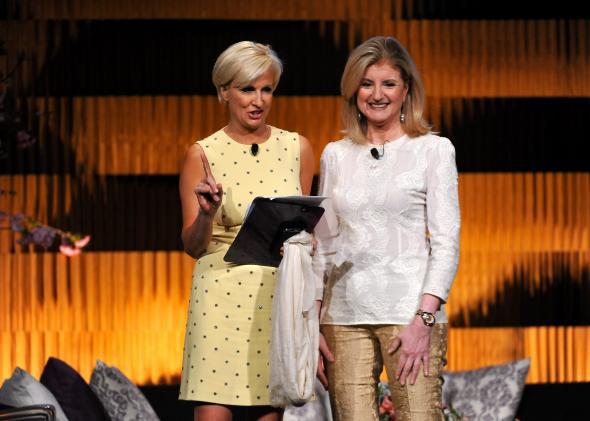Jessica Bennett at the New York Times writes about a rapidly expanding business of corporate-sponsored, celebrity-studded feminist conferences and events, where well-heeled women get together and talk about empowering less well-heeled women here and around the world. Even just a few years ago, feminism was still considered a grubby, unglamorous cause. But by focusing on getting more women into leadership positions and reminding potential sponsors that women have money to spend, famous feminists like Gloria Steinem and Tina Brown have opened a funding stream for endless numbers of panels, speeches, and award ceremonies. “What were once grass-roots gatherings have become commercial enterprises: star-studded events with corporate sponsors like Toyota and Walmart,” Bennett writes.
As someone who writes about “women’s” issues, I have really mixed feelings about these events, and not just because my love of free food and alcohol competes with my unwillingness to stand around making chit-chat while wearing heels. On one hand, as Jessica Valenti told Bennett, “The fact that corporations want to be associated with women’s causes at all is certainly progress.” However, corporate sponsors have a way of quietly refocusing these kinds of conferences away from the nitty-gritty issues that face ordinary American women and toward elite women congratulating one another for getting increasingly richer. The money wants to hear “inspiring” stories of women overcoming obstacles to become leaders, leaving little room for the less inspiring but more important stories of ordinary women getting chewed up by insurmountable obstacles like lack of health care, child care, or job opportunities. (Many of these conferences will address issues like violence and education, but prefer to focus on developing nations rather than all the work that needs to be done closer to home.)
Some of the programming is downright insipid, as my colleague Amanda Hess discovered when she went to the Thrive conference and endured discussions about how to maximize your productivity by taking sleep more seriously. Worse, the stampede to demonstrate how women can be rich muckety-mucks just like men sometimes leads to working directly against the larger goals of actual feminism. I’ve criticized the women’s leadership groups Lean In and MAKERS in the past for celebrating Rep. Ileana Ros-Lehtinen, despite the fact that she supports policies that are ruinous for the vast majority of American women, such as limiting access to reproductive health care and voting against equal pay legislation. But she is the first Latina elected to Congress, and the optics of that are much more attractive than the boring old policy discussion about how ordinary Latina women only make 60 cents for every dollar men make or how attacks on reproductive rights disproportionately affect Latinas.
Ros-Lehtinen is hardly the only female leader who works against women’s interests to be lauded by MAKERS, an organization that produces short videos on “trailblazing” and “groundbreaking” American women. Anti-feminists Monica Crowley and Kay Bailey Hutchison have gotten their own laudatory videos.* Even Condoleezza Rice, one of the architects of the Iraq War, which resulted in religious authorities reasserting dominance over women in Iraq, gets a glossy MAKERS video.
This tension came to a head recently when Valenti, writing for the Nation, called out TEDWomen for never having a single talk about abortion, even though restrictions on it have created a public health crisis around the world. TED organizers were clearly embarrassed, responding by trying to discredit Valenti’s reporting and hiding behind the claim that they don’t have an official policy against talks on abortion. But of course, they don’t need an official ban. All you need is the general understanding that corporate feminism is supposed to be controversy-averse, more about feeling good than fixing problems.
Correction, May 20, 2014: This post originally misspelled Kay Bailey Hutchison’s last name.
